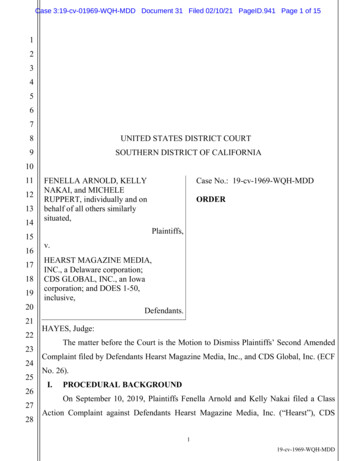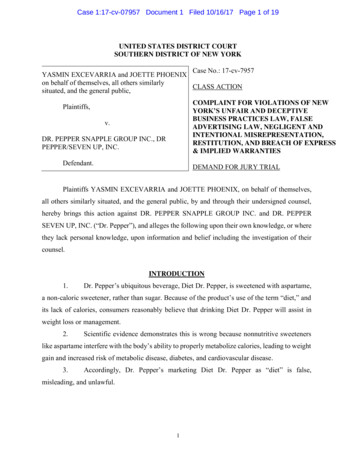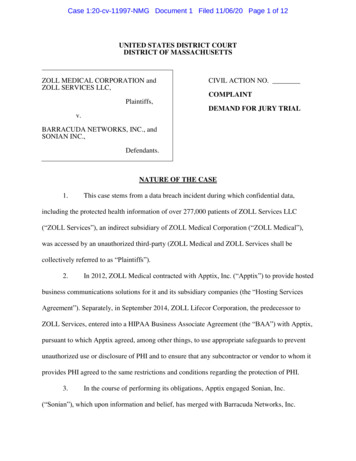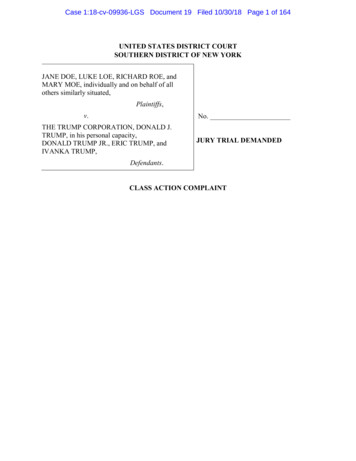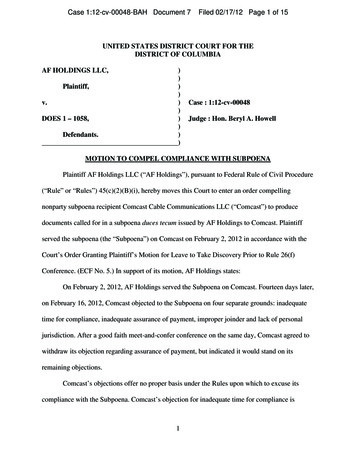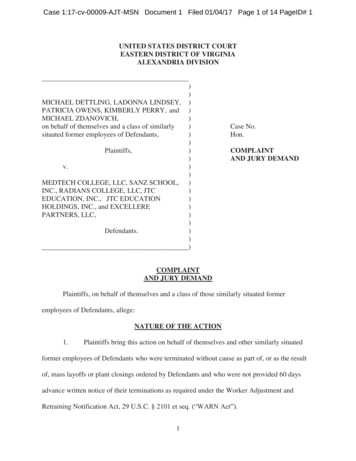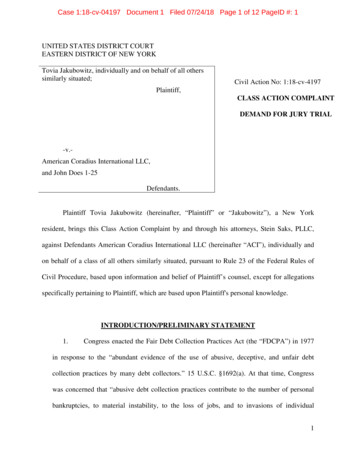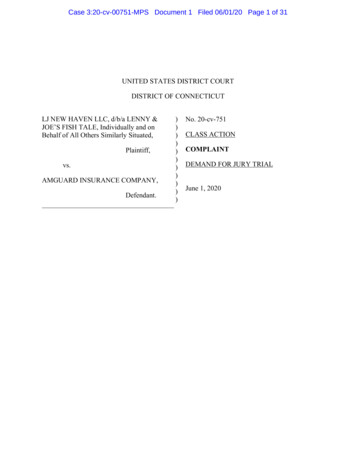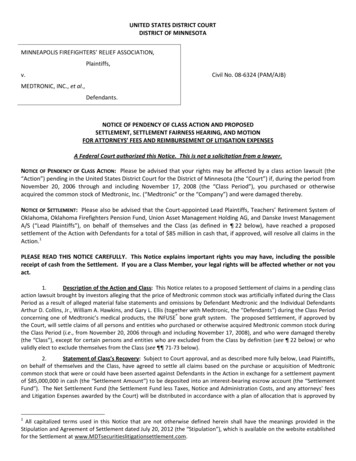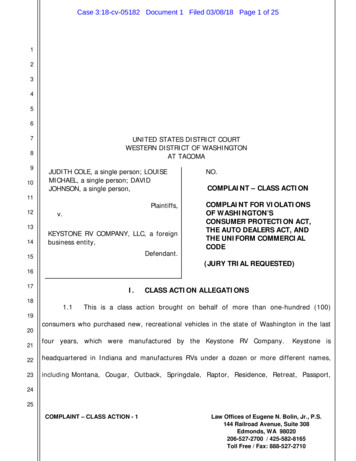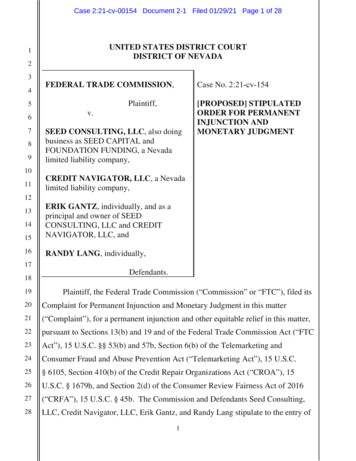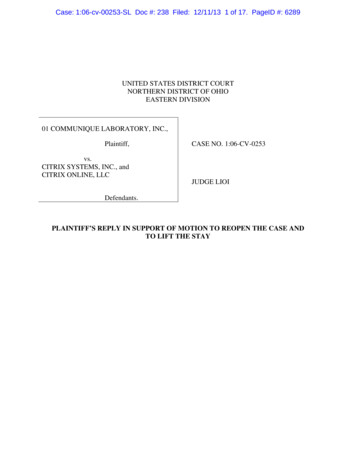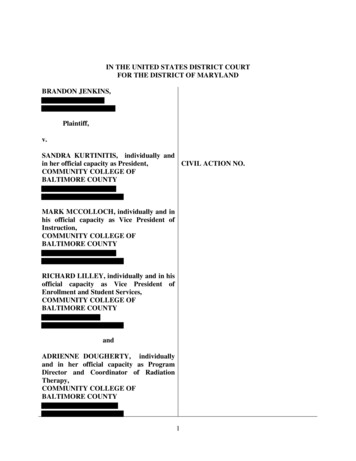
Transcription
IN THE UNITED STATES DISTRICT COURTFOR THE DISTRICT OF MARYLANDBRANDON JENKINS,Plaintiff,v.SANDRA KURTINITIS, individually andin her official capacity as President,CIVIL ACTION NO.COMMUNITY COLLEGE OFBALTIMORE COUNTYMARK MCCOLLOCH, individually and inhis official capacity as Vice President ofInstruction,COMMUNITY COLLEGE OFBALTIMORE COUNTYRICHARD LILLEY, individually and in hisofficial capacity as Vice President ofEnrollment and Student Services,COMMUNITY COLLEGE OFBALTIMORE COUNTYandADRIENNE DOUGHERTY, individuallyand in her official capacity as ProgramDirector and Coordinator of RadiationTherapy,COMMUNITY COLLEGE OFBALTIMORE COUNTY1
Defendants.VERIFIED COMPLAINTPlaintiff, Brandon Jenkins, by and through counsel, brings this action for relief againstSandra Kurtinitis, President of The Community College of Baltimore County, Baltimore,Maryland (“CCBC”); Mark McColloch, Vice President of Instruction at CCBC; Richard Lilley,Vice President of Enrollment and Student Services at CCBC; and Adrienne Dougherty, ProgramDirector and Coordinator of Radiation Therapy at CCBC, and hereby states as follows:INTRODUCTION1. In April 2013, following Mr. Jenkins’s completion of the admission requirements andprocess for acceptance to CCBC’s Radiation Therapy Program, whereby he met the standards ofa competitive candidate and scored the maximum points allowed during his observation,Mr. Jenkins was informed that he would not be admitted to the program in part because thecollege viewed religion to be a major part of Mr. Jenkins’s life, and, as one faculty memberexplained on behalf of CCBC, the “field [of radiation therapy] is not the place for religion.”2. Mr. Jenkins made several attempts to address with Defendants the discriminatoryreasoning upon which they denied Mr. Jenkins admission to the program: retaliation as a resultof his expression of his religious views. Defendants, however, affirmed Defendant Dougherty’sinitial determination not to admit Mr. Jenkins to the program and the reasoning upon which sherelied.3. This lawsuit seeks damages, a declaratory judgment, and injunctive relief requiringDefendants to accept Mr. Jenkins into CCBC’s Radiation Therapy Program and prohibiting them2
from further retaliating and/or discriminating against Mr. Jenkins based on his religious viewsand/or his expressions thereof.JURISDICTION AND VENUE4. This action raises federal questions under the First Amendment to the United StatesConstitution and 42 U.S.C. § 1983.5. This Court has original jurisdiction over these federal claims pursuant to28 U.S.C. §§ 1331 and 1343, and supplemental jurisdiction over the state claim pursuant to28 U.S.C. § 1367. This Court has authority to award the requested damages pursuant to28 U.S.C. § 1343 and 42 U.S.C. § 1983; the requested declaratory relief pursuant to28 U.S.C. §§ 2201-02; and costs and attorneys’ fees pursuant to 42 U.S.C. § 1988.6. Venue is proper in this district pursuant to 28 U.S.C. § 1391(e) because Defendantsreside in this district and/or all of the acts described in this Complaint occurred in this district.PARTIES7. Brandon Jenkins is a private citizen and prospective student for the RadiationTherapy Program at CCBC.8. Defendant Sandra Kurtinitis serves as the President of CCBC. President Kurtinitis isthe official through whom the CCBC Board of Trustees carries out its policies. She is responsiblefor the conduct and operation of the college and for the administration and supervision of itsdepartments.9. Defendant Mark McColloch serves as the Vice President of Instruction at CCBC.According to the college’s website, Defendant McColloch is a member of the President’s SeniorStaff and serves as an educational leader, not just a manager, functioning as part of a senior level3
management team that fosters pride and excellence in the institution in a human, supportiveenvironment. Defendant McColloch is responsible for, among other things, overseeing allinstruction; bringing overall leadership to the development, maintenance, and improvement ofquality instruction and academic support services across the college; creating and supporting astudent-centered environment; supporting the principle that “diversity is everybody’s business”through the daily performance of duties and responsibilities; providing flexible, responsive, andhigh quality customer service to all students; and advancing the core principles of the college’smission, vision, and strategic priorities.10. Defendant Richard Lilley serves as the Vice President of Enrollment and StudentServices at CCBC. According to CCBC’s website, Defendant Lilley is a member of thePresident’s Senior Staff and is responsible for the leadership, direction, coordination, andsupervision of all service areas under the auspices of Enrollment and Student Services, whichinclude academic advising, testing, student retention services, and admissions.11. Defendant Adrienne Dougherty serves as the Program Director and Coordinator ofthe Radiation Therapy Program at CCBC. Defendant Dougherty is responsible for overseeingand coordinating the processing of applications for the Radiation Therapy Program, academicadvising, testing, and evaluation; and admissions to the program.STATEMENT OF FACTS12. CCBC is a public community college organized and existing under the laws of theState of Maryland.4
13. CCBC is governed by the Board of Trustees, the President, and Vice Presidents.CCBC’s mission, as published on its website, is to “provide[] an accessible, affordable, and highquality education that prepares students for transfer and career success, strengthen the regionalworkforce, and enrich[] [the] community.”14. CCBC and its representatives are required to abide bythe followingnondiscrimination policy, as published on CCBC’s website:Nondiscrimination and Equal OpportunityThe Community College of Baltimore County does not discriminate against anyindividual for reason of race, sex, color, religion, national or ethnic origin, age,sexual orientation or conditions of handicap in the admission and treatment ofstudents, educational programs and activities, scholarship and loan programs,hiring of faculty and staff, or any terms and conditions of employment.CCBC recognizes the value of a diverse work force that is reflective of thestudents and of the community we serve, and as such, the college is committed towelcoming, respecting and embracing the differences and similarities of ouremployees and our students.We acknowledge the richness of multiculturalism and diversity. We hold eachmember of the college community responsible and accountable for fostering aclimate of acceptance, inclusion, respect and dignity of all persons.15. In January 2013, and in accordance with CCBC’s guidelines for admission, Mr.Jenkins submitted his application for admission to the Radiation Therapy Program for theupcoming Fall 2013 semester.16. According to CCBC’s college catalog, the academic credentials of the mostcompetitive candidates for CCBC’s Radiation Therapy Program include a minimum 2.5 overallGPA and completion of select courses (including BIOL 109 or BIOL 220 & BIOL 221, MATH135, PHYS 101 and RTTT 101) with a grade of “C” or above.5
17. According to CCBC’s college catalog, “Radiation Therapy utilizes radiation andradioactive isotopes in the treatment of disease, primarily cancer. [A] Radiation Therapistprovides services for treatment of malignant and non-malignant disease. [A] Radiation Therapistis responsible for localizing the tumor, implementing the treatment plan, observing andevaluating clinical progress of the patient.”18. At the time of his application for admission, Mr. Jenkins had completed each of therequired courses and had obtained the following grade in each course: “B” in BIOL 109, “A” inMATH 135, “C” in PHYS 101, and “A” in RTTT. Mr. Jenkins’s overall GPA of approximately3.2 exceeded the GPA criteria of a competitive candidate for the program.19. Shortly after the submission of his application, Mr. Jenkins was invited to continuewith the admissions process, which included an observation and interview with program officialsand/or representatives, as well as completion of a writing sample and critical thinking exam.20. CCBC’s admission policy to the Radiation Therapy program is based on a three-partpoint system with the following weighted areas: (1) Prerequisite GPA – 30%; (2) Interview &Observation Day – 40%; and (3) Writing Sample and Critical Thinking Exam – 30%.21. Following completion of the writing sample and critical thinking exam on or aboutMarch 21, 2013, Mr. Jenkins was invited to interview with program officials to compete for aspot in the program for the upcoming Fall 2013 semester.22. During his interview, a panel of five representatives of CCBC, which includedDefendant Dougherty, asked Mr. Jenkins a series of questions.23. Mr. Jenkins recalls that during the interview, he was asked what led him to pursue acareer in radiation therapy, to which Mr. Jenkins responded that he first considered pursuit of a6
degree in the medical field following the suggestion of a friend and mentor that his skills madehim an ideal candidate for nursing or a similar profession in the medical field.24. At the time Mr. Jenkins applied to the Radiation Therapy Program (and beginning inJuly 2011), Mr. Jenkins served as the Director of Harvest House, Inc., a faith-based home formen working to overcome life-controlling problems, whose purpose is to help residents achievespiritual, emotional, mental, and physical well-being through counseling, mentoring, job andfinancial training programs, and the development of supportive networks designed to help menset and reach goals, and overcome generational cycles of poverty, lack of education andunemployment.25. Mr. Jenkins communicated to the panelists that two of his greatest strengths includethat he is “a people person” and a “team player.”26. Also during the interview, the panelists asked Mr. Jenkins the broad question, “Whatis the most important thing to you?” Mr. Jenkins simply answered, “My God.”27. The panel did not follow up with further questions regarding Mr. Jenkins’s religiousbeliefs, and Mr. Jenkins did not mention his religious beliefs in response to the panelists’questions regarding the attributes that he felt made him most suitable for the program.28. On or about April 19, 2013, Mr. Jenkins received notice that he had not been selectedfor admission to the Radiation Therapy Program.29. This came as a surprise to Mr. Jenkins because his overall GPA exceeded thestandards of a “competitive candidate” for the program, as described in CCBC’s admissionscatalog. In addition, Mr. Jenkins had received the maximum points allowed on the observationportion of the interview day (which consisted of 40% of his overall score for admission).7
30. On April 21, 2013, in an attempt to obtain clarity regarding CCBC’s decision not toadmit him, Mr. Jenkins emailed Defendant Dougherty requesting “the reason(s) [he] was notchosen for the radiation therapy program,” and explained that he might consider applying for theprogram again. See E-mail between Brandon Jenkins and Adrienne Dougherty dated April 21,2013, attached hereto as Exhibit A.31. On that same day, approximately forty-five (45) minutes later, Defendant Doughertyresponded to Mr. Jenkins’s email. See Exhibit A.32. Defendant Dougherty explained that while Mr. Jenkins may have been directed tocontact Charles Martino, Case Manager for the Radiation Therapy program, she would be happyto respond to his question and include Mr. Martino in her response.33. In her email, Defendant Dougherty identified two areas in which Mr. Jenkins scoredlower than other candidates: (1) his GPA and (2) his interview.34. Specifically, Defendant Dougherty explained that while Mr. Jenkins’s grades weregood, “there were other students who had higher GPA scores, which [accounts for] 30% of theevaluation process.” See Exhibit A.35. Defendant Dougherty then listed the reasons why Mr. Jenkins lost points during hisinterview, offering the following explanation:I understand that religion is a major part of your life and that was evident in yourrecommendation letters, however, this field is not the place for religion. We havemany patients who come to us for treatment from many different religions andsome who believe in nothing at all. If you interview in the future, you may wantto leave your thoughts and beliefs out of the interview process.Id.8
36. Defendant Dougherty explained that the “the other reason [for lost points] is yourdesire to stay in Maryland”:I feel that I would be doing you a disservice if I allowed you into the program andyou are not able to find a job based on your past. When you first contacted me,you wanted me to be honest, I don’t want you to waste 2 years pursuing a careeryou won’t be able to work in. I have seen it happen in the past. Although jobsare opening in the near future, it is primarily through two employers in Marylandand it is highly likely these insitiutions [sic] will not hire you based on your past.They will not directly say it, but it has happened in the past.Id.37. Defendant Dougherty noted, however, that she was not sure “how other states are,”should Mr. Jenkins decide to leave Maryland. Id.38. Defendant Dougherty’s reasoning was somewhat puzzling to Mr. Jenkins because,although Defendant Dougherty referred to aspects of Mr. Jenkins’s past that she felt might makeit difficult for him to gain employment in Maryland, neither these areas of his past nor Mr.Jenkins’s willingness to work outside the State of Maryland following completion of theRadiation Therapy Program were raised in his admissions interview.Instead, during theinterview, Mr. Jenkins was asked only if he preferred to stay in Maryland after school, to whichhe simply replied, “Yes.”39. Notably, CCBC advertises its Radiation Therapy Program as one that “is nationwidein scope” and thus is not limited to serving only those students who will ultimately practice inthe state of Maryland. See CCBC letter to ACLJ dated July 18, 2013, attached hereto asExhibit C.40. Defendant Dougherty’s reasoning is also inconsistent with prior communicationsMr. Jenkins had with her.9
41. Early in the admission process, and prior to Mr. Jenkins’s submission of hisapplication to the Radiation Therapy Program, Mr. Jenkins had specifically inquired ofDefendant Dougherty whether a single criminal charge he received more than ten (10) years agowould interfere with his ability to obtain a job following completion of the Radiation TherapyProgram.42. Defendant Dougherty assured Mr. Jenkins that a former student of the RadiationTherapy Program had successfully obtained a job in Washington, D.C., despite his criminalrecord.43. At that time, Defendant Dougherty further assured Mr. Jenkins that any uncertaintyregarding his ability to obtain a job in Maryland would not be a reason not to accept him into theprogram.44. Despite these prior statements, Defendant Dougherty ended her April 21, 2013 e-mailresponse to Mr. Jenkins by offering to put him in contact with a director of anotherdepartment/program that might be more suitable for him than the Radiation Therapy Program.45. Following receipt of Defendant Dougherty’s e-mail, on April 30, 2013, Mr. Jenkinscontacted Miriam Milsom, Executive Director of CCBC Human Resources, in order to appealhis non-admission to the Radiation Therapy Program based upon his expression of his religiousbeliefs during his interview, and in his recommendation letters. See E-mail between BrandonJenkins and Penny Milsom dated May 3, 2013, attached hereto as Exhibit B46. Upon information and belief, based upon Ms. Milsom’s statements in her May 1,2013 e-mail response to Mr. Jenkins’s April 30, 2013 e-mail, which specifically referenced10
Defendant Dougherty’s April 21, 2013 e-mail (Exhibit A), Mr. Jenkins’s complaint wasforwarded to the Vice President of Student Services, Defendant Richard Lilley, for review.47. Mr. Jenkins never received any response from Defendant Lilley.48. On May 3, 2013, Ms. Milsom responded again to Mr. Jenkins’s email and explainedthat she had discussed his complaint with Vice President of Instruction, Mark McColloch, andthat “religion was not a factor in any decision regarding your course of study at CCBC.” Ms.Milsom continued by suggesting, “I believe Ms. Dougherty was attempting to give you somehelpful advice.” See Exhibit B.49. On June 28, 2013, Mr. Jenkins, by and through his attorneys, and in accordance withMaryland’s Local Government Tort Claims Act, Md. Courts and Judicial Proceedings Code Ann.§ 5-301, et seq., contacted CCBC President, Defendant Kurtinitis, and Defendant Dougherty,recited the facts regarding the conduct by CCBC and its employees during the admissions andinterview process, and informed them that such conduct violated the First Amendment andCCBC’s nondiscrimination policy. See Letter from ACLJ to Sandra Kurtinitis dated June 28,2013, attached hereto as Exhibit D.50. On July 18, 2013, CCBC, by and through its attorney, responded to ACLJ’sJune 28, 2013 letter of and, fully supporting Defendant Dougherty’s decision and explanation,denied any wrongdoing and offered additional discriminatory explanation for CCBC’s decisionnot to admit Mr. Jenkins to the Radiation Therapy Program. See Exhibit C.51. Specifically, CCBC explained that Dr. Dougherty’s advice to Mr. Jenkins to “leaveyour thoughts and beliefs out of the interview process”, “stated bluntly . . . is not bad advice” and11
that Defendant Dougherty was simply suggesting that Mr. Jenkins “not wear [his religiousviews] on his sleeve.” Id. at 5.52. CCBC provided further support for its discriminatory decision, taking the positionthat “Mr. Jenkins’s reliance for motivation upon his religious beliefs during the interview wasnot the best answer to the motive question.” Id. at 5.53. CCBC concluded its letter by stating that while Dr. Dougherty’s “words may havebeen inartfully stated,” they were justified because “the fact is that in any secular job or programinterview it is better to have a concrete reason for wanting to undertake the training at hand thanto say only that God directed one to do it. That is true for every job from astronaut to attorney.”Id. at 6.54. As a result of CCBC’s discrimination and retaliation against Mr. Jenkins forexpression of his religious beliefs, Mr. Jenkins was unable to receive the proper training andeducation required at CCBC for a career in radiation therapy.55. As a result of CCBC’s discrimination and retaliation against Mr. Jenkins forexpression of his religious beliefs, and with the knowledge that Defendants were of the opinionthat such beliefs and opinions did not belong in the radiation therapy field, Mr. Jenkins wasdeterred from submitting a new application for admission to the Radiation Therapy Program forthe upcoming Fall 2014 semester.56. As a result of each of the Defendants’ actions, Plaintiff has suffered, and continues tosuffer, economic injury and irreparable harm and is therefore entitled to an award of monetarydamages, including punitive damages, and equitable relief.12
CAUSES OF ACTIONCOUNT I(Violations of the First Amendment – Freedom of Speech)57. The allegations of Paragraphs 1 through 56 above are incorporated by referenceherein as if fully set out.58. The First Amendment protects private speech from government interference,restriction, or discrimination when the specific motivating ideology or the opinion or perspectiveof the speaker is the rationale for the restriction or discrimination.59. Plaintiff’s expression of religious views enjoys First Amendment protection.60. Defendant Dougherty unlawfully deprived Plaintiff of his First Amendment rights inconnection with and arising from his application for admission to CCBC’s Radiation TherapyProgram by denying Plaintiff admission on the basis of his expression of his religious beliefs andviewpoint.61. Defendants Kurtin
According to CCBC’s website, Defendant Lilley is a member of the President’s Senior Staff and is responsible for the leadership, direction, coordination, and supervision of all service areas under the auspices of Enrollment and Student Services, which include academic advising, testing, stu
